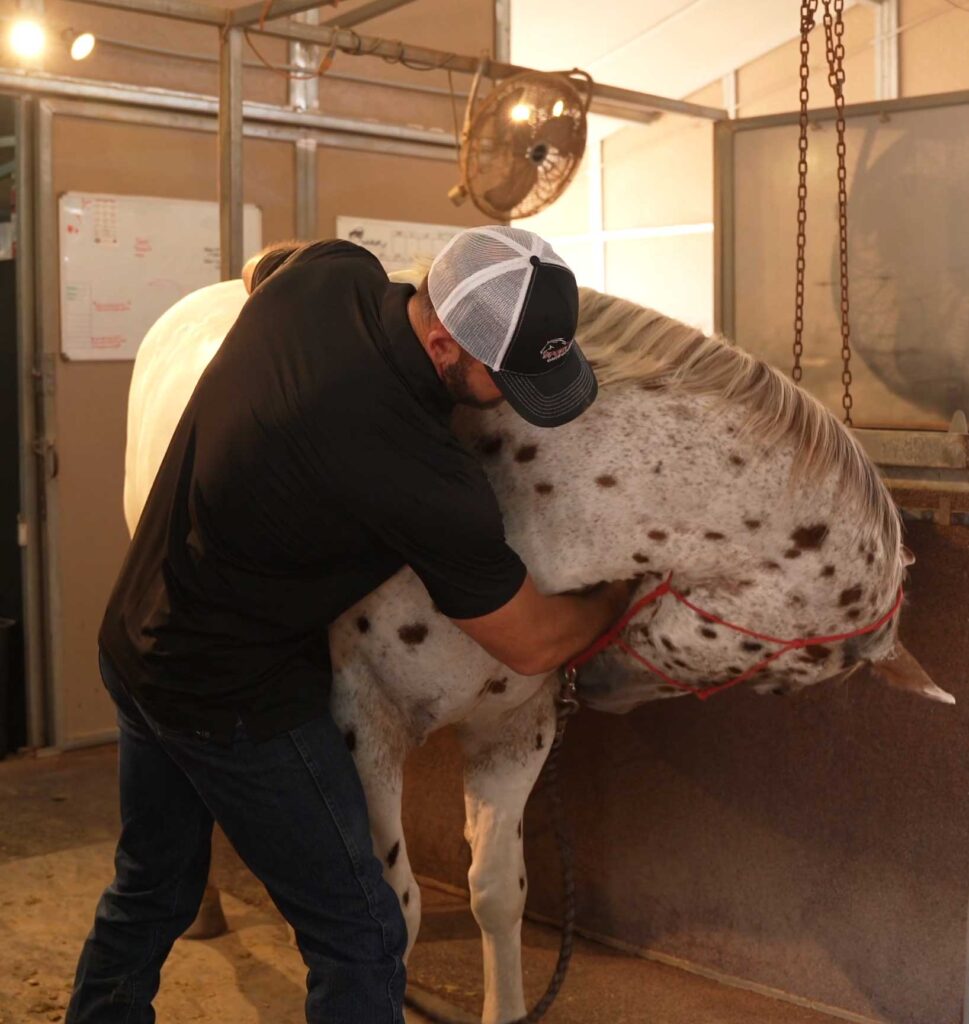Expert Equine Care at Your Fingertips
FAQ
Welcome to the Sport Horse Chiropractic FAQ page!
Whether you’re new to our services or just looking for more information, we’ve compiled some of the most common questions we receive from horse owners like you. We’re here to help you and your equine partner achieve optimal health and performance.
If you don’t find the answer you’re looking for, please don’t hesitate to reach out—our team is ready to assist you with any questions or concerns.
FAQ with Dr. Mike Adney
Dr. Mike of Sport Horse Chiropractic discuss several of the questions he often gets about their horse chiropractic services.
Your Questions Answered
Services & Scheduling
What areas does Sport Horse Chiropractic serve?
We cover the entire state of Arizona, and are happy to come to you, depending on how many horses you would like to have adjusted. We also travel out of state and internationally, depending on how many horses you would like scheduled and the regulations in your specific state or country. Contact Us for more information!
How can I schedule a mobile chiropractic session?
602-726-5186. Dana, our Scheduling Coordinator, will assist you with the process.
What does it cost to get my horse adjusted?
Horses and Dogs: $170
People: $75
For clients located within a 15-mile radius of Queen Creek, there is NO horse minimum to book an appointment and NO travel fee.
Can you adjust me, or my dog, while you're here?
Yes!
An adjustment for your dog is $170.
An adjustment for a human is $75.
What are your Travel Fees?
For clients located OUTSIDE a 15-mile radius of Queen Creek, we have the following travel fees and horse minimums:
- 16-30 miles from Queen Creek:
- Additional $30 travel fee
- Additional $30 travel fee
- 31-50 miles from Queen Creek:
- Additional $60 travel fee
- A minimum of 4 horses must be booked in your location
- 51-100 miles from Queen Creek:
- Additional $90 travel fee
- A minimum of 6 horses must be booked in your location
Horses located over 100 miles, please contact us for pricing.
Can I haul my horse to you to save money on travel fees?
You are always welcome to haul your horse to Horseshoe Park in the Queen Creek area and incur no travel fee.
Are there discounts if I am a regular customer?
Yes!
We have two Membership Packages available:
VIP: One adjustment every 8 weeks
$160 and no travel fees
VIP+: One adjustment every 4 weeks
$150 and no travel fees
Stretching Masterclass
What is the Equine Stretching Masterclass?
The Equine Stretching Masterclass is a comprehensive online program with 25 step-by-step video tutorials designed to teach horse owners effective stretching techniques to improve their horse’s flexibility, performance, and help prevent injuries.
The course includes
1. 26 Stretching Tutorials
2. Step-by-Step Instructions
3. Over 90 minutes of Video Content
How much does the Horse Stretching Masterclass cost?
The horse stretching masterclass is a one-time payment of $197.
Your purchase includes all future additions to the course, including: more videos, downloadable PDF guides, live Q&As, and more!
Can I get a refund for the Stretching Masterclass?
Due to the potential of screen-recording, all purchases are non-refundable.
Why do I need to stretch my horse?
Horses are athletes. No different than human athletes! All human athletes stretch before they compete, and if you want to get the most out of your horse’s performance, stretching them is essential!
Am I strong enough to stretch my horse?
There are many different ways to accomplish these stretches. In these videos, you’ll learn different ways to do them, that are safe and effective, no matter how big or strong you are. The pressure point stretches can be done, regardless of your size, and provide an extremely effective way to stretch your horses.
How much time do I need to spend stretching my horse?
Is there a free preview?
Access to the Stretching Masterclass provides valuable content and is only available for purchase.
However, you CAN download our 2-Step Guide To Solving Hind End Issues for FREE! Simply enter your name and email in the red box at the bottom of this page.
General Questions about Equine Chiropractic
How often does my horse need to be adjusted?
If you have a performance horse, a horse that’s in vigorous training, or if you ride them often, we recommend you have your horse checked and adjusted every 8 weeks. Horses that are not used very often, are retired, used for breeding, or just taken on light trail rides, can go as long as 6 months between chiropractic adjustments. These are general recommendations, but be aware that each situation is highly dependent upon which discipline the horse competes in, their history, conformation, and use case, as well as client preferences.
Does my horse need a day off after being adjusted?
Contrary to popular opinion, horses do NOT need time off after their adjustments. In fact, the last thing you want is to put your horse in a stall and let them sit afterwards. The more movement the better, after they’re worked on. The best thing for them, post-adjustment, is turnout and time in a round-pen. Movement helps to prevent tightness and soreness, and also helps to combat the ever-present muscle memory! So get’em moving!
If I get my horse adjusted, does he have to keep getting adjusted forever?
This is a very common question and concern in the human chiropractic world as well. There are two answers to this.
#1 You don’t HAVE to do anything… BUT when you feel how amazing your horse moves after getting adjusted, you won’t have to keep him adjusted, but you’ll WANT to!
#2 We spend a lot of money on maintaining our horses. We have their feet trimmed every 6-8 weeks, we have their teeth floated every year, we give them the best feed, the best supplements, and we do everything we can to keep them healthy and performing at their best. With all of this maintenance, it just makes sense to maintain the health of the spine and extremities!
Is it safe to get my horse adjusted?
Yes, chiropractic care is generally safe for horses when performed by a trained and certified professional. Our practitioners use non-invasive techniques to assess and address misalignments in the spine and joints, helping to improve mobility and alleviate discomfort. Just like in human chiropractic care, it’s essential to have a thorough evaluation to ensure that the treatment is appropriate for your horse’s specific needs and condition. We prioritize your horse’s well-being and work closely with you and your veterinarian to provide safe and effective care.
What should I expect during a chiropractic session?
During a horse chiropractic session, you can expect a thorough evaluation and gentle, hands-on treatment. Here’s a breakdown of what typically happens:
-
Initial Assessment: The session begins with a discussion about your horse’s medical history, current health status, and any specific concerns or issues you’re noticing. This helps the chiropractor understand your horse’s needs.
-
Physical Examination: The chiropractor will conduct a comprehensive physical examination, observing your horse’s posture, gait, and range of motion. They may also palpate, or feel, various parts of the body to identify areas of tension, pain, or restriction.
-
Chiropractic Adjustments: Based on the assessment, the chiropractor will perform specific adjustments to the spine, joints, and other areas as needed. These adjustments are done with controlled force and precise movements to restore alignment and improve function. The techniques are gentle and tailored to each horse’s size and condition.
-
Post-Treatment Discussion: After the adjustments, the chiropractor will discuss their findings and the treatments performed. They may provide recommendations for follow-up care, exercises, or other therapies to support your horse’s recovery and well-being.
-
Follow-Up: Depending on your horse’s condition, the chiropractor may suggest a schedule for follow-up sessions to monitor progress and maintain optimal health.
The entire process is designed to be comfortable for your horse and to promote overall health and performance. We always prioritize the safety and comfort of your horse during each session.
Can chiropractic adjustments for my horse help with specific conditions?
- Back Pain and Discomfort:
It’s important to work with a qualified chiropractor who can evaluate your horse’s specific needs and conditions. They will develop a tailored treatment plan in coordination with your veterinarian to ensure comprehensive care.
How do I know if my horse needs to be adjusted?
I like to compare this to how when you’re driving car, you know exactly how that car is supposed to feel because you’re used to driving that particular car. So if you get in your car one day and all of a sudden you notice a vibration, or it’s pulling to the left, or you’re just not getting that performance out of your car that you normally do, that’s an indication that you need to take your car in to get checked out.
It’s the same situation when you are riding your horse and you’re feeling that your horse isn’t moving or performing like it normally does, even if you can’t put your finger on exactly why. That means it’s time to have us come check them.
But overall, chiropractic is best used as maintenance care. If you wait until a problem arises, we’re already behind the curve because now we have to fix those problems before we can get to maintenance care and optimizing that performance.
We recommend getting your horse checked out and then getting them on a maintenance schedule. That way we can keep them performing at their best, and optimizing that performance.
Can you sedate my horse before his adjustment?
If we feel that it’s necessary, we will have you contact your veterinarian and have them meet us for the appointment. Then they can perform the sedation for you.
Submit your Questions
Have a question about our Horse Chiropractic Services or the Equine Stretching Masterclass?
We’d love to hear from you!
Use the form below to submit your questions, and we’ll get back to you as soon as possible.

